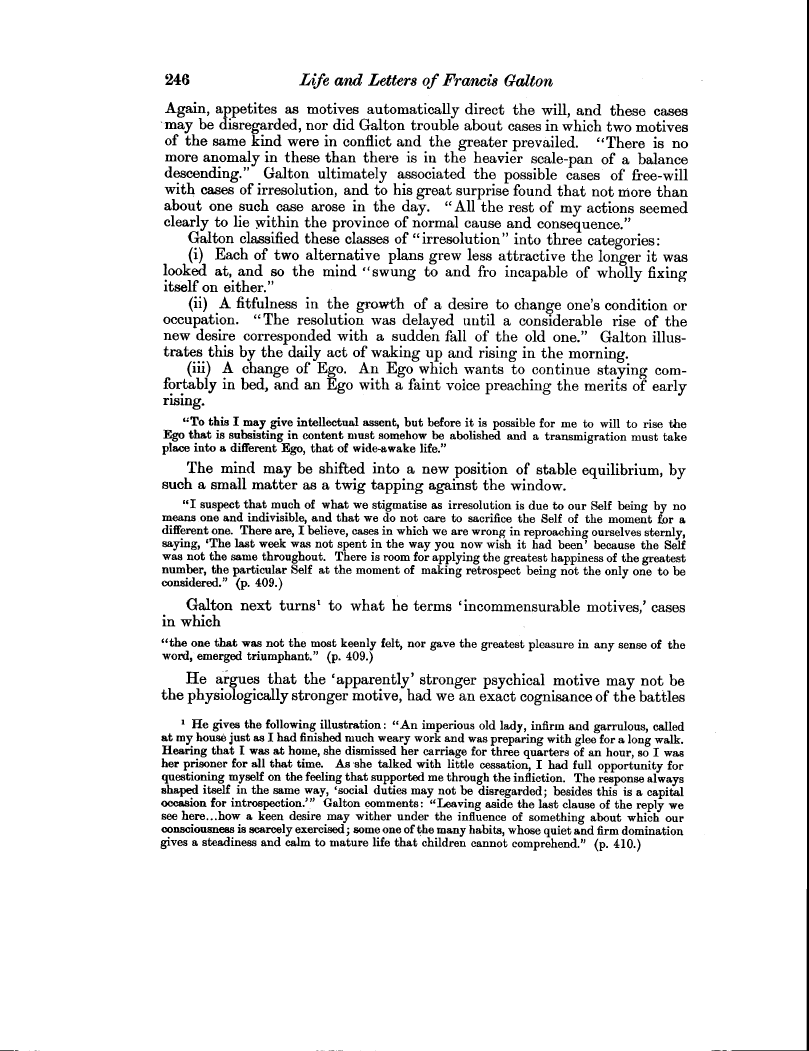246 Life and Letters of Francis Galton
Again, appetites as motives automatically direct the will, and these cases may be disregarded, nor did Galton trouble about cases in which two motives of the same kind were in conflict and the greater prevailed. "There is no more anomaly in these than there is in the heavier scale-pan of a balance descending." Galton ultimately associated the possible cases of free-will with cases of irresolution, and to his great surprise found that not more than about one such case arose in the day. "All the rest of my actions seemed clearly to lie within the province of normal cause and consequence."
Galton classified these classes of "irresolution" into three categories:
(i) Each of two alternative plans grew less attractive the longer it was looked at, and so the mind "swung to and fro incapable of wholly fixing itself on either."
(ii) A fitfulness in the growth of a desire to change one's condition or occupation. "The resolution was delayed until a considerable rise of the new desire corresponded with a sudden fall of the old one." Galton illustrates this by the daily act of waking up and rising in the morning.
(iii) A change of Ego. An Ego which wants to continue staying comfortably in bed, and an Ego with a faint voice preaching the merits of early rising.
"To this I may give intellectual assent, but before it is possible for me to will to rise the Ego that is subsisting in content must somehow be abolished and a transmigration must take place into a different Ego, that of wide-awake life."
The mind may be shifted into a new position of stable equilibrium, by such a small matter as a twig tapping against the window.
"I suspect that much of what we stigmatise as irresolution is due to our Self being by no means one and indivisible, and that we do not care to sacrifice the Self of the moment for a different one. There are, I believe, cases in which we are wrong in reproaching ourselves sternly, saying, `The last week was not spent in the way you now wish it had been' because the Self was not the same throughout. There is room for applying the greatest happiness of the greatest number, the particular Self at the moment of making retrospect being not the only one to be considered." (p. 409.)
Galton next turns' to what he terms `incommensurable motives,' cases in which
"the one that was not the most keenly felt, nor gave the greatest pleasure in any sense of the word, emerged triumphant." (p. 409.)
He argues that the `apparently' stronger psychical motive may not be the physiologically stronger motive, had we an exact cognisance of the battles
' He gives the following illustration : "An imperious old lady, infirm and garrulous, called at my house just as I had finished much weary work and was preparing with glee for a long walk. Hearing that I was at home, she dismissed her carriage for three quarters of an hour, so I was her prisoner for all that time. As -she talked with little cessation, I had full opportunity for questioning myself on the feeling that supported me through the infliction. The response always shaped itself in the same way, 'social duties may not be disregarded; besides this is a capital occasion for introspection."' Galton comments: "Leaving aside the last clause of the reply we see here ... how a keen desire may wither under the influence of something about which our consciousness is scarcely exercised; some one of the many habits, whose quiet and firm domination gives a steadiness and calm to mature life that children cannot comprehend." (p. 410.)

